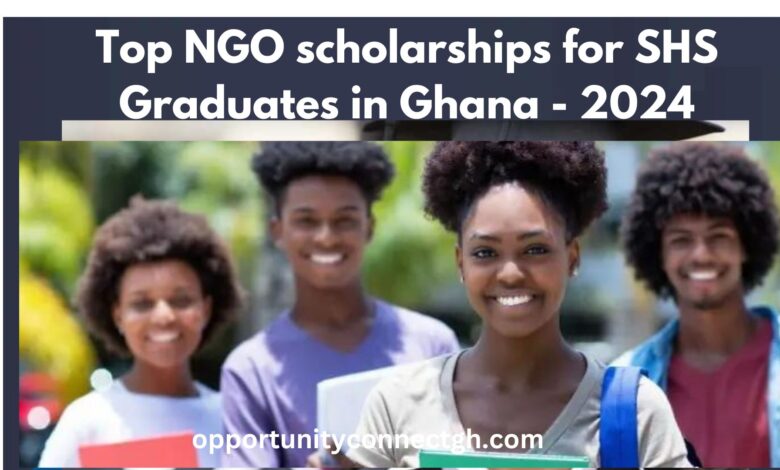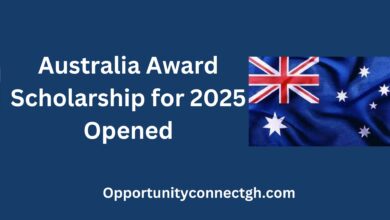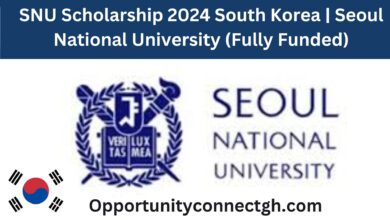Top NGO scholarships for SHS Graduates in Ghana – 2024

Introduction: Unveiling NGO Scholarships for SHS Graduates in Ghana in 2024
As 2024 unfolds, the academic landscape for senior high school (SHS) graduates in Ghana is experiencing a transformative phase, significantly influenced by the crucial role of non-governmental organisations (NGOs). Scholarships emerge as glimmering beacons of hope in a country where financial limitations frequently impede educational advancement. It provides the much-needed support to those eager to continue their educational journey.
NGOs, in their commitment to fostering learning and development, have become instrumental in this educational revolution. They provide a range of scholarship opportunities tailored to address the diverse needs of Ghanaian SHS graduates. These organisations are not just funders; they are enablers of dreams, bridging the gap between talent and opportunity.
The importance of these NGO scholarships cannot be overstated. They do more than just alleviate the financial burden; they unlock doors to higher education and professional growth and, ultimately, contribute to the nation’s development. For many SHS graduates in Ghana, these scholarships are the keys to a future that once seemed out of reach.
In this evolving educational environment, ‘NGO Scholarships for SHS Graduates in Ghana’ in 2024 are more than just financial aid; they are catalysts for change. They empower young minds, nurture potential, and sow the seeds for a brighter, more educated future. This article aims to explore these transformative opportunities, shedding light on the various NGO scholarships available and how they are shaping the educational prospects of Ghana’s youth. By illuminating these paths, we hope to guide SHS graduates towards realising their academic ambitions and contributing meaningfully to their communities and country.
List of NGOs Scholarships for SHS Graduates in Ghana in 2024
1. Vodafone Ghana Foundation Scholarship Scheme
The Vodafone Ghana Foundation Scholarship Scheme (VGFSS), offered by a leading telecommunications network in Ghana, provides significant educational support to students facing financial challenges yet demonstrating exceptional academic abilities. This scholarship is open to all Ghanaian students who have successfully gained admission to any public university in the country.
Eligibility Criteria
- Ghanaian citizenship is a must.
- Applicants should exhibit financial need.
- Admission to a public university in Ghana is required.
- The applicant must have an excellent academic track record.
[Click here to apply for the Vodafone Ghana Foundation Scholarship Scheme.] (https://www.britishcouncil.org.gh/vodafone-scholarship-scheme)
2. David Oyedepo Scholarship Foundation (Empowering African Students through Education)
The David Oyedepo Scholarship Foundation awards scholarships to students from various African countries who are pursuing masters, undergraduate, and secondary education programmes. The scholarship aims to foster academic excellence and personal development.
Eligibility Requirements
- Must be a citizen and resident of an African country.
- Proficiency in English (reading, writing, and speaking) is required.
- Applicants must be aged between 18 and 25 at the time of application.
- A strong academic record at the secondary school level is essential.
3. MTN Ghana Foundation Scholarship
Supporting Bright Futures in Ghana
The MTN Ghana Foundation Scholarship targets academically talented yet financially needy students in Ghana. This scholarship caters to both first-year and continuing students in public tertiary institutions across Ghana.
Eligibility
- Ghanaian citizenship.
- a commitment to academic excellence.
- submission of a one-page motivation letter stating why the MTN Foundation should award the scholarship.
- Continuing students must maintain a minimum GPA of 3.0-4.0.
4. Kingdom Books and Bursary Scheme (Fostering Academic Excellence at KNUST)
The Kingdom Books and Bursary Scheme is specifically designed for KNUST students in Ghana who demonstrate both academic potential and financial need. The scheme provides support to fifty deserving students.
Requirements
- Ghanaian residency.
- not currently receiving any financial aid or scholarships.
- Students from the second to the fourth year with at least a second-class grade point average at the time of application are eligible.
5. Catholic University of the Sacred Heart Africa Scholars Programme (Enabling Postgraduate Studies for African Talents)
This scholarship programme is tailored for academically gifted African students seeking postgraduate degrees. It’s an opportunity to advance education at a higher level.
Eligibility
- African nationality.
- Proficiency in English must be proven.
- A bachelor’s degree from a recognised institution is required.
6. Africa Initiative for Governance Scholarship at the University of Oxford (Promoting Public Policy Education for West African Students)
Launched in 2017, the Africa Initiative for Governance (AIG) Scholarship opens doors for exceptional West African students to pursue a Master of Public Policy at the Blavatnik School of Government, University of Oxford.
7. Timothy Ansah Memorial Foundation Scholarship (Empowering Western Region Students in Ghana)
This scholarship supports academically outstanding but financially disadvantaged students from Ghana’s Western Region to pursue university education at KNUST.
Eligibility and Documentation
- Residency in Ghana is required.
- Applicants should be in their 2nd, 3rd, or 4th year of undergraduate studies.
- not a recipient of any other financial aid or scholarship.
- Necessary documents include admission and acceptance letters, WASSCE certificates, high school transcripts, and recommendation letters.
Note on NGO Scholarships in Ghana
Most NGO scholarships, such as those offered by the MTN Ghana Foundation, are provided by private institutions and non-profit organizations. These NGOs rely significantly on donations and charitable contributions to fund their scholarship programmes, meaning available grants are often limited. Therefore, students are encouraged to apply early and meet all specified criteria to increase their chances of receiving these valuable educational grants.
How to Maximise Your Chances for an NGO Scholarship in Ghana
Securing an NGO scholarship in Ghana requires not just eligibility but also a strategic approach to the application process. In a competitive landscape where many are vying for limited opportunities, it’s crucial to stand out. Here’s how you can enhance your chances of winning an NGO scholarship.
Tips on Preparing a Compelling Application
- Understand the Scholarship Criteria: Each scholarship has specific requirements. Thoroughly understand what the NGO is looking for, be it academic excellence, leadership potential, or financial need.
- Tailor your application: Customise your application to align with the scholarship’s objectives. Generic applications are less likely to be successful. Show how your goals and values match those of the scholarship programme.
- Highlight Your Unique Qualities: What makes you different? Whether it’s your community service, leadership roles, personal challenges you’ve overcome, or your passion for your field of study, let these shine through.
- Gather Strong Recommendations: Letters of recommendation can have a significant impact. Choose referees who know you well and can speak to your strengths and suitability for the scholarship.
- Craft a compelling personal statement: This is your chance to tell your story. Discuss your background, academic and career goals, and how the scholarship will help you achieve them. Be honest, reflective, and passionate.
- Demonstrate Financial Need: If the scholarship is need-based, provide clear and honest information about your financial situation. Be transparent and provide the necessary documentation to support your claims.
- Prepare for Interviews: If the scholarship process involves an interview, prepare thoroughly. Be ready to discuss your application, your future plans, and how the scholarship fits into your goals.
- Proofread and revise: Before submitting, check your application for any errors. Ask a teacher, mentor, or friend to review your application and provide feedback.
- Adhere to Deadlines: Submit your application well before the deadline. Rushing at the last minute can lead to mistakes or incomplete applications.
- Stay informed and persistent. Keep track of various scholarship opportunities and apply to as many as you qualify for. Don’t be discouraged by rejections; use them as learning experiences to improve future applications.
Frequently Asked Questions
-
Are NGO scholarships only for university education?
not necessarily. While many focus on tertiary education, some scholarships may be available for vocational training or other forms of post-secondary education.
-
Can I apply for multiple NGO scholarships simultaneously?
Yes, you can apply for multiple scholarships as long as you meet the eligibility criteria for each. However, be mindful of each scholarship’s requirements and commitments.
-
What should I include in my personal statement?
Your personal statement should include your educational and career objectives, personal background, challenges you’ve faced, and how the scholarship will help you achieve your goals.
-
How do I prove my financial need?
Provide authentic financial documents like income statements, tax returns, or evidence of family financial obligations. Honesty is crucial in these disclosures.
-
Can I apply for an NGO scholarship if I’m already receiving financial aid?
This depends on the scholarship’s rules. Some may allow it, while others require that you do not have other financial aid.
-
What happens if my academic performance drops after receiving the scholarship?
Most scholarships have a minimum grade requirement. If your grades fall below this, you may lose the scholarship. It’s important to maintain consistent academic performance.
-
Are there scholarships for specific fields of study?
Yes, some scholarships are targeted at specific fields like engineering, healthcare, or agriculture. Research scholarships that align with your field of study.
-
Can working adults apply for NGO scholarships?
Working adults can apply if they meet the eligibility criteria, especially for scholarships aimed at professional development or further education.
-
How long does it take to process a scholarship application?
The processing time varies depending on the NGO. Generally, it could take a few weeks to a few months from the application deadline.
-
Is there an age limit for applying for NGO scholarships?
Some scholarships have age restrictions, usually for undergraduate programmes. However, many scholarships for postgraduate studies or professional development do not have an age limit.
Overall, ‘NGO Scholarships for SHS Graduates in Ghana’ in 2024 offer life-changing opportunities for students. A well-prepared application and a clear understanding of the process are key to maximising your chances of securing these valuable scholarships.




